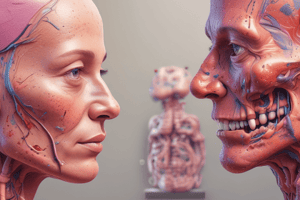Podcast
Questions and Answers
What temperature is considered to be fever?
What temperature is considered to be fever?
- 39°C (102.2°F)
- 40°C (104°F)
- 37°C (98.6°F)
- 38°C (100.4°F) (correct)
What is the most common cause of early postoperative fever?
What is the most common cause of early postoperative fever?
- Immune-mediated reactions to medications or blood products
- Inflammatory stimulus of tissue damage (correct)
- Malignant hyperthermia
- Infection
When are infections related to the surgical procedure more common?
When are infections related to the surgical procedure more common?
- After discharge from the hospital
- Within the first 3 days after surgery
- Starting on postoperative day 4 (correct)
- Immediately after surgery
What is the differential diagnosis of postoperative fever?
What is the differential diagnosis of postoperative fever?
What is the most common cause of immediate postoperative fever?
What is the most common cause of immediate postoperative fever?
What is self-limited 'physiologic' fever?
What is self-limited 'physiologic' fever?
What correlates with the degree of the fever response after surgery?
What correlates with the degree of the fever response after surgery?
What can stimulate cytokine release and cause postoperative fever?
What can stimulate cytokine release and cause postoperative fever?
Flashcards are hidden until you start studying
Study Notes
Postoperative Fever: Causes, Timing, and Differential Diagnosis
- Postoperative fever is common and can pose a diagnostic challenge for the care team.
- Fever is defined as 38°C (100.4°F) or higher, but this can vary between hospitals and units.
- Most early postoperative fever is caused by the inflammatory stimulus of tissue damage and exposure to foreign materials that occurs during surgery.
- Infections related to the surgical procedure are more common starting on postoperative day 4, but the differential diagnosis also includes noninfectious conditions.
- It is important to consider a broad differential and not to assume that fever is due to infection.
- Fever as a manifestation of infection may be reduced or absent in immunocompromised patients.
- The timing of fever after surgery is one of the most important factors to consider in generating a differential diagnosis.
- The differential diagnoses of infectious and noninfectious causes of fever are categorized into immediate postoperative, early postoperative, late postoperative, and delayed.
- Immediate postoperative fever has its onset in the operating suite or within hours after surgery and can be caused by inflammation, trauma or burn-induced inflammation, immune-mediated reactions to medications or blood products, malignant hyperthermia, or infections predating the operation.
- Self-limited "physiologic" fever is common following most major surgeries and is caused by inflammatory pyrogenic cytokine mediators.
- The magnitude of tissue trauma correlates with the degree of the fever response, and laparoscopic cholecystectomy is associated with less trauma and fewer episodes of postoperative fever compared with open cholecystectomy.
- Bacterial endotoxins and exotoxins can also stimulate cytokine release and cause postoperative fever, and elevated levels of bacterial DNA have been demonstrated with polymerase chain reaction testing.
Studying That Suits You
Use AI to generate personalized quizzes and flashcards to suit your learning preferences.




